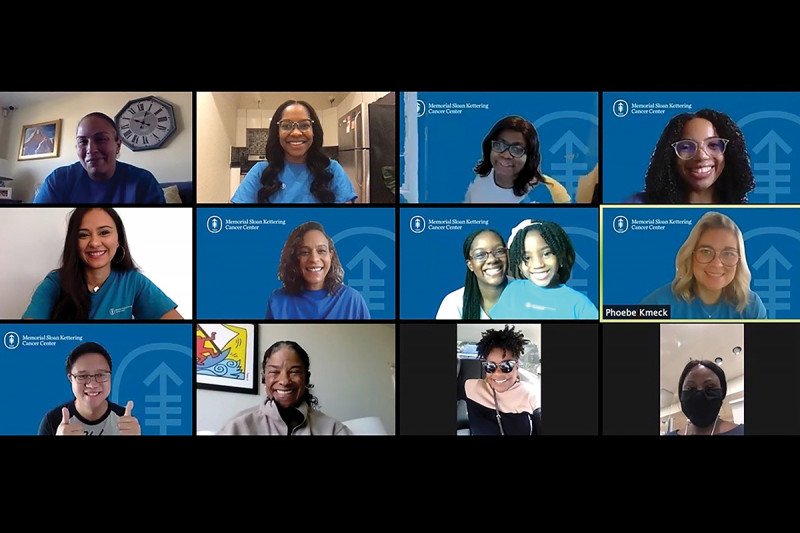
Top row (from left): Julia Ramirez, Jocelyn Triplett, Lorna J. Lewis, and Glenni Santos. Middle row (from left): Esraa Soliman, Vanessa Rodriguez, Shakima Grant (with daughter Sariah), and Phoebe Kmeck. Bottom row (from left): Noel Collo, Carol Brown, Nicola Buchanan, and Akua Sarkodee.
Julia Ramirez was looking at her computer screen with tears in her eyes, and her 6-year-old son, Teo, wanted to know why. She tried to explain the deep emotions welling up as she viewed this year’s African American Day Parade at a Zoom watch party with her Memorial Sloan Kettering colleagues.
“I was part of the parade the past two years, and I remember the feeling of being on the MSK float and people in the crowd being so happy to see us and saying, ‘Thank you so much, you saved my life,’” says Ms. Ramirez, Director of Patient Relations at MSK.
MSK had floats in the previous two African American Day Parades, usually held in Harlem. This year’s parade, on September 20, was converted into an online event because of COVID-19 concerns and included a series of performances and testimonials honoring Black culture.
MSK takes part in the annual parade to bring awareness to cancer screening and treatment services, including at the MSK Ralph Lauren Center in Harlem. Gynecologic surgeon Carol Brown, who joined the watch party, emphasized the importance of MSK’s active presence in the parade and engagement with the African American community in New York City.
“African Americans suffer a disparity in terms of their cancer outcomes,” says Dr. Brown, who was recently named MSK’s new Chief Health Equity Officer. “I’m very happy about MSK’s ongoing participation because we are a leader in cancer care, and we are striving to be a leader in cancer health equity.”
About 15 staff members attended the one-hour watch party, which was sponsored by MSK’s Black, Latino, Asian, and Multiracial (BLAM) Employee Resource Network and the Office of Diversity Programs in Clinical Care, Research, and Training.
The watch party began right before the parade, kicked off by a video featuring MSK staffers sharing personal experiences of being in the parade and testifying to the importance of MSK’s participation. Then, during the online parade, MSK had a “float” — a 60-second video of MSK nurse Alisha Varughese singing “Rise Up” over a montage of MSK essential workers as well as information about cancer screening at the MSK Ralph Lauren Center.
“Being at the regular parade as a representative of MSK means a lot to us and the Harlem community because it shows that we care,” says Esraa Soliman, a Systems Analyst & Trainer and co-leader of BLAM along with Ms. Ramirez. “Seeing people in their own neighborhood where they are comfortable, instead of a hospital setting, is very different,” she says. “The watch party brought back all those feelings, like we were all still there.”


